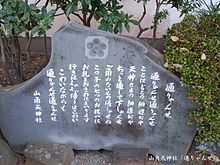Tōryanse
"Tōryanse" (通りゃんせ) is the name of the traditional Japanese children's tune (warabe uta). It is a common choice for music played by traffic lights in Japan when it is safe to cross.
Lyrics
The words to the song are:
| Japanese: | Romaji: | Translation: |
| 通りゃんせ 通りゃんせ | Tōryanse, tōryanse | You may go in, you may enter |
|
|
|
| 天神さまの 細道じゃ |
Tenjin-sama no hosomichi ja |
This is the narrow pathway of the Tenjin shrine |
|
|
|
| 御用のないもの 通しゃせぬ | Goyō no nai mono tōshasenu | Those without good reason shall not pass |
|
|
|
|
|
|
|
行きはよいよい 帰りはこわい |
Iki wa yoi yoi, kaeri wa kowai |
Going in is easy, but returning is scary |
| こわいながらも | Kowai nagara mo | It's scary, but |
| 通りゃんせ 通りゃんせ | Tōryanse, tōryanse | You may go in, You may pass through |
Explanation

There are many theories to the origin of the song, but all agree that it is a portrayal of an exchange between a civilian and a guard manning some sort of a checkpoint — at Kawagoe Castle according to one theory. In the old days when infant mortality was high, people celebrated when a child survived to reach the age of 7 (as well as 3 and 5; see Shichi-Go-San), and ordinary people were only allowed to visit the shrine within the castle compound for special occasions.
This particular warabe uta is sung as part of a traditional game where two children facing each other link their hands to form an arch 'checkpoint', and the remaining children walk through underneath in a line (and back round again in circles). The child who happens to be under the arch when the song finishes is then 'caught'.
The tune being played at Japanese pedestrian crossings is an analogy to this game, i.e., it is safe to cross until the music stops.
Popular culture
Tōryanse can be heard in:
- Adrift in Tokyo, 31:08 to 31:17
- Afro Samurai (video game), Battle against Kuma
- Amatsuki, episode 1, Meeting Yakou (background music)
- The Animatrix in the short film Beyond
- Black Lagoon, episode 7, "The Second Barrage"
- Bleach
- Boogiepop Phantom
- Chakushin Ari 2 sung by the blind lady named Shu-Mei Gao
- Chaos;Head: The song is frequently used to prank call the protagonist, by switching the song with a loud buzz noise. Later in the game, the song serves as a defense mechanism for an important machine.
- Corpse Party on the Sony PSP, sung by children during two different scenes
- Death Note, episode 30
- Dennō Coil, episode 17
- Earth Girl Arjuna
- Ground Defense Force! Mao-chan, Episode 10
- Hand Maid May
- Higurashi no Naku Koro ni, Wheel of Fortune, played at the beginning of the first live action movie, includes lines from Tōryanse.
- Horizon on the Middle of Nowhere, the 'Song of Passage' is based on this song.
- I"s, in the OVA (children song)
- Ichigo Mashimaro, episode 6
- Jigoku Shoujo Futakomori: episode 2, from 3:07 to 3:19
- Karin: In the animation series, episode 9, from 13:02 to 13:15.
- Lost in Translation
- Magical Pokaan, 10 seconds' worth at 15:11 in episode 12
- Mahō Tsukai ni Taisetsu na Koto: Natsu no Sora
- Mawaru Penguindrum, episode 14 a line from the nursery rhyme is displayed on the screen in the train
- Neo Tokyo (film) from 28:02 to 28:10
- Ninja Sentai Kakuranger, episode 1
- Nocturnal Illusion, mentioned by the main character
- Noragami, Yato sings a line of it when crashing at Tenjin's shrine for the night (episode 2, from 13:44 to 13:50; same scene appears in manga chapter 3, p.159).
- Nura: Rise of the Yokai Clan: The yokai, Tōryanse, is a member of the Hundred Tales Clan.
- Paranoia Agent
- Ping Pong Club
- Pokémon, episode 352 (AG076): a version rewritten to be about the Pokémon Baltoy (Yajiron) is sung more than once.
- Power In Numbers: A sample of children singing the line "Nie no nai mono tōshasenu" is used in the track 'Acetate Prophets'
- Pride (episodes 5 and 8)
- Pom Poko
- Rainy Soul (Music by Garnet Crow)
- Rurouni Kenshin, episode 16, sung by Sasaki Heihachirou's students at the end of the episode
- Sayonara: The Takarasiennes sing the song as they cross the bridge to their dormitories.
- Serial Experiments Lain
- Shakugan no Shana II: beginning of first episode.
- Shikabane Hime: episode 2, several times
- Tatami Galaxy: episode 7
- Tokyo Tower: Mom and Me, and Sometimes Dad, probably from 6:24 to 6:49
- Urusei Yatsura, episode 53
- Witchblade, episode 5